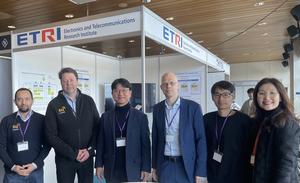image:
ETRI researchers and professors from the University of Oulu and the University of Helsinki attending the 6G Symposium 2024 Spring in Finland (Namseok Ko, director of ETRI’s Mobile Core Network Research Division, third from the left)
View more
Credit: Electronics and Telecommunications Research Institute (ETRI)
South Korean researchers are strengthening the country’s leadership in the global market through the development of 6G, the next-generation mobile communications technology.
The Finnish Electronics and Communications Research Institute (ETRI) announced that it showcased its latest research results at the 6G Symposium 2024 Spring, held in Oulu, Finland from April 9 to 11, attracting the attention of attendees.
At the symposium, ETRI notably showcased its “service mesh” technology, a key 6G technology that addresses the complex communication problem between a large number of cloud-native mobile network functions that are dynamically created or terminated in cloud environments.
6G mobile networks are evolving away from the dedicated hardware equipment structure of existing 4G/5G networks and towards a cloud-native architecture where mobile network functions are virtualized into software services that are developed, deployed, run and managed in a cloud environment.
As a result, network functions developed as microservices in a variety of languages and environments are being deployed and operated on the cloud. To provide users with smooth mobile services, complex control signals must be exchanged quickly between these microservices, but traditional mechanisms have faced issues such as communication delays due to inefficient communication methods.
ETRI’s newly developed service mesh architecture has significantly improved communication latency by reducing existing network procedures by more than 80%. The number of times a packet passes through the network stack has been reduced from 24 round trips to just four. By completely separating the business logic and communication logic that were mixed within the existing network functions and adopting an agent that can selectively use high-speed communication methods such as gRPC, ETRI has achieved faster network speeds and reduced costs.1)ETRI has used an open source remote procedure call (RPC) framework to enhance signal processing performance in its mobile core network.
1) gRPC: An open-source remote procedure call framework originally developed by Google. It uses HTTP/2 as a transport and Protocol Buffers as an interface definition language, and provides features such as authentication, bidirectional streaming, flow control, blocking and non-blocking bindings, cancellation and timeouts.
In addition, it provides a 6G development environment that allows network function developers to focus on developing core mobile service functions, without having to worry about communication logic such as network service registration, discovery, connection, and authentication.
“ETRI’s service mesh technology can be adopted as a core technology for cloud-native 6G mobile networks,” said Ko Nam-seok, head of ETRI’s Mobile Core Network Research Division. “This technological development is expected to realize faster and more efficient 6G communication services, contributing to the development of global communication technology.”
The research team said the symposium, held as part of the EU 6G Flagship Project, was an opportunity to solidify South Korea’s position as a global leader in the field of communications technology.
ETRI also announced plans to further expand and commercialize the technology through the Next Generation Communications Industry Technology Development Project, promoted by the Ministry of Science and ICT.
###
This research was conducted as part of the Ministry of Education, Culture, Sports, Science and Technology’s “International Collaborative Research on 6G Network Architecture and Core Technologies.”
About the Electronics and Telecommunications Research Institute (ETRI)
ETRI is a non-profit, government-funded research institute. As a global ICT research institute, ETRI has made great efforts to realize Korea’s remarkable growth in the field of ICT industry since its establishment in 1976. ETRI is making Korea the world’s leading ICT nation by constantly developing the world’s first and best technologies.
Disclaimer: Neither AAAS nor EurekAlert! are responsible for the accuracy of news releases posted to EurekAlert! by contributing institutions or for any use of information provided through the EurekAlert system.


